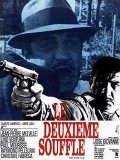
| Cast: | Lino Ventura, Paul Meurisse, Raymond Pellegrin, Christine Fabrega, Marcel Bozzuffi, Pierre Zimmer |
| Genre: | Film Noir/Drama |
| Director: | Jean-Pierre Melville |
| Screenplay: | Jean-Pierre Melville & Jose Giovanni from Giovanni's novel Un reglement de comptes |
| Cinematography: | Marcel Combes |
| Composer: | Bernard Gerard |
| Runtime: | 144 minutes |
Jean-Pierre Melville weaves an intricate web of shaky alliances that can only lead to deception and double crossing. Melville doesn’t condense Second Breath as much as some of his others because the focus isn’t as specifically on his main character, making it less in line with Robert Bresson, but at nearly 2 ½ hours it’s one of the most complex and intricately plotted film noirs in every possible good way.
Fated fading criminal Gustave Minda (Lino Ventura) escapes from prison 16 years after being framed by Jo Ricci (Marcel Bozzuffi), but lacks the resources to make a clean break from Paris. Visiting his lover Manouche (Christine Fabrega), he kills two of Jo’s men who are attempting to blackmail her. On the recommendation of his friend Orloff (Pierre Zimmer), who opts out of the armored car robbery because it involves killing the escorting guards, Gu winds up being the fourth man in the gang of Jo’s more accomplished brother Paul Ricci (Raymond Peelegrin).
Commissaire Blot (Paul Meurisse), an equally ruthless taskmaster who is different from Gu largely due to the side of the law he represents, pursues the escaped criminal with atypical diligence. He doesn’t question witnesses and suspects, he tells them his theories to see how they react. Understanding how to use the distrust of gangsters against them and sometimes matching violence with violence (though the censors quelled this theme by forcing Melville to cut a scene of police torture), Blot is portrayed as being worse than cold killer Gu because he’s deceptive and thus can’t be trusted.
The main change Gu sees from the old days is cops and robbers have become co-dependent, a major violation of his strict moral code. Not that he wasn’t guilty of many things, but Gu rotted in jail rather than rat out the actual perpetrator of the crime he was imprisoned for, and he’d rather die than even be thought a stoolie.
Melville isn’t interested in a specific morality, but rather suiting the actions to his characters, so whether anyone agrees or identifies with them is largely irrelevant. His heroes live by their ethics until their destined death, and Gu is one of Melville’s classic idealized tragi-criminals trapped in a hopeless web of betrayal. Though not as solitary as Le Samourai’s Jef, and despite valuing loyalty above all else, there’s an impossibility stemming from your environment (line of work) that prevents you from being with those who care about him.
Unlike Jules Dassin’s Rififi, Melville’s focus isn’t so much on the caper, but rather how the rituals it entails define the thought process and mindset of the characters. Still, the film isn’t exactly psychological. What’s interesting about Melville is while the minute observations of the entire step by step process link him to Bresson, his aesthetic is self conscious and dreamy. The mix of location shooting realism with film noir expressionism combined with his detached shooting style makes his characters sometimes seem to be willing participants in their own demise. They do what they are allowed with ritual precision even though they know it’s a dead end.
As always, Melville’s tales of honor and loyalty are expertly photographed and extremely intense. This is one of his most violent films. Even when the action is largely left to the imagination, there’s a savagery to it stemming from the cold calculated efficiency. The shielding and mysterious qualities of stairways are one of the many examples of the tension Melville creates from very well utilized architecture. The action scenes are riveting because Melville creates suspense through showing the entire lead in using only amplified natural sounds. By refusing to rush the scenes and impose the obvious emotional manipulation on the audience, the anxiety becomes excruciating. The combination of good actors and Melville’s specific posing of their every move leads to memorable turns. Though not quite as good as Le Samourai, the film certainly deserves to be seen.
    |